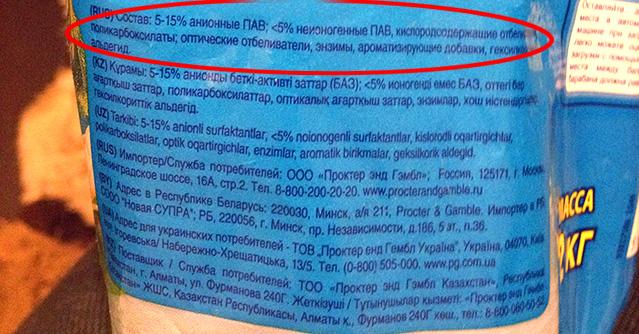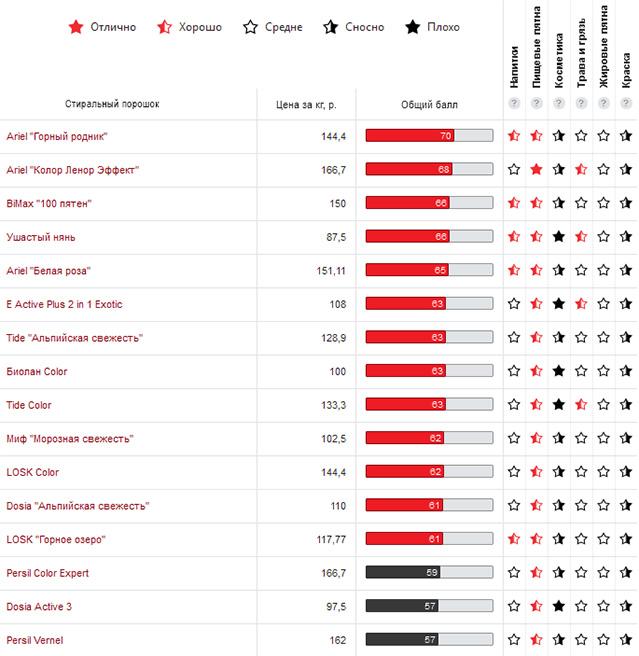How long have you been using a washing machine? Have you ever thought about whether you use the right powder for washing, and how powders generally differ from each other? Now we will figure out which washing powder is best for an automatic machine and how to choose it correctly, and also find out whether it is worth overpaying for a brand and advertising.
Unfortunately, or, conversely, fortunately, today the market is oversaturated with detergents - washing powders for machines are no exception, which are very numerous on store shelves, and advertising misleads the buyer even more and a completely logical question arises: which manufacturer to choose and what pay attention when buying.
Choosing the right washing powder
Let's forget for a while about advertising and well-known brands that we constantly see on store shelves. Imagine that there are no brands and we have completely similar bags and boxes with laundry detergent in front of us. So to speak, we will carry out a control purchase without the purchase itself. If we have presented this, then we only have to read the composition of the powders, let's do this.
Almost all laundry detergents surfactants are in the first place in the composition, the so-called surfactants, which combine perfectly with fats and other contaminants and wash them out of clothing.This is the main component that provides washing clothes. The rest is various additives, dyes, fragrances, fragrances, bleaches, limescale additives in washing machines, defoamers, etc.

The exception is children's washing powders or biopowders., in which the percentage of surfactants is much lower.
It is the presence of certain additives and their quantity that the washing powders differ from each other. Additives can be different for different types of clothing and improve the washing of certain stains or certain types of fabrics.
The quality of washing laundry with washing powder for washing machines, and manual ones, too, will be determined by the correct ratio of certain enzymes and their correspondence to the type of laundry and the type of pollution, as well as the quality of these same enzymes, because some manufacturers can use better chemical materials, others are cheaper.
It is also very important to choose the right detergent for the type of clothes you are going to wash. So, for example, for washing a down jacket in a washing machine Do not use ordinary washing powders. In this case, be sure use special detergents for washing down jacketsif you don't want to permanently ruin your down jacket!
Therefore, in order for the washing powder to better cope with pollution choose it for your occasion. Typically, the manufacturer indicates this information on the packaging: for white linen, for colored linen, against stains, etc.
Compare the composition of more expensive powders with cheaper ones, they may be the same and theoretically should wash exactly the same, but in practice everything can differ, so test washing is indispensable.
Automatic washing powder test
As we have already understood, without practical experiments it will not be possible to determine the quality of washing powders and the conformity of its quality to those declared by the manufacturer, therefore, an automatic machine cannot do without a test of washing powders.
You, of course, you can do this test yourself: for this you will need several different washing powders, several identical fabrics with the same types of pollution, as well as an automatic washing machine.
You need to wash all dirty fabrics with powder from different manufacturers in turn with the same amount of powder and compare the result, so to speak, by eye.
But such experiments are quite laborious. and will not give an unambiguous result, because all powders can cope the same way, but if you change the type of fabric or type of pollution, then the indicators will be different. Agree that it is quite laborious to carry out tests not only with different types of pollution, but also with different fabrics. Imagine how much time and effort it will take, but the result may still not be satisfactory, because a lot also depends on the washing machine itself.
That's why there are special stands for testing washing powders on an industrial scale. Such a stand consists of several different washing machines with different characteristics, in which test washings with various types of pollution are carried out. After washing, the fabrics are checked on special optical equipment for the presence of remaining dirt, after which a verdict is made on the compliance of the powder with standards and requirements.
Specialists of the ProductTest site made a test purchase and carried out automatic washing powder testwhich we would like to show you:

The test was carried out on different types of stains, so we can say for sure that each test subject could show his ability to remove certain stains. But, as you can see from the test, some expensive powders turned out to be worse than the cheapest ones and did not cope well with the test.
Conclusion: You should not believe advertising and buy expensive powders: the price is not a guarantee of high-quality laundered things.
How to use automatic washing powder
- Do not use washing powders for hand washing in automatic machines. - such washing powders have increased foaming, which will lead to the washing machine overflowing with foam.
- Choosing the right detergent for the type of laundry and type of soiling is a guarantee that the powder will do its job better, and you will get cleaner laundry.
- Pour the washing powder exactly in the dose indicated on its packaging - do not put too much washing powder, this will lead to an excess of foam.
- The less laundry in the washing machine, the less powder - always put the amount of detergent corresponding to the amount of laundry in the drum.
- For washing at low temperatures, put less powder - the powder does not dissolve well in cold water, so you can put it less so as not to waste it.
And the most important thing: always read the instructions on the package any detergent and follow it.

Comments
My surprise knows no bounds. Which washing powder test? What about washing gels? There has long been an alternative to these harmful powders. I buy Wellery Delicate gels for myself. Not a single powder washes lace blouses from wool as gently and effectively as the Wool gel from this series.Tried it multiple times, got all my friends hooked on it. Washes well with hands too. And here you can even get into the machine with him. Nothing spoils, very careful. There are no phosphates in the composition, as in powders! And you can safely wash in warm and cool water, nothing will sit down, will not stretch. I actually washed a cashmere scarf once with Valerie Wool in the washing machine. Like dry-cleaned - fresh and beautiful.
I like washing gel. Oh, those white men's shirts, which are dirty on the collar and cuffs for two socks! ... Already in a grandmother's way, and in various ways I tried to wash by the time I discovered this gel. It was washed off with a creak, but the linen is a pity - after such manipulations it deteriorated, turned gray, wore out. Gel Intensive for white saved me a lot. White shirts are an integral part of my husband's wardrobe, and I'm a perfectionist, so I can't let them be off-white.So now I have a feeling of complete satisfaction: the shirts are really white and at the same time we began to buy them less often.
I also like washing gel. Much more than any powders. Most importantly, the powders smell! You put them in the car, and you need a fan to destroy the smell of bleach in the bathroom. The gel doesn't smell. And in fact, it washes clothes quite delicately. And then it doesn't smell like powder. In addition, linen is not stained. In a word, I haven’t used powder for a long time, only gel.
Not bleach, but phosphates, a pronounced smell. The gel is much better and in some ways even more effective, it has already been tested more than once. And if you don't give a damn about your health, then you shouldn't be surprised where all the diseases come from.
Wash with laundry soap!!!